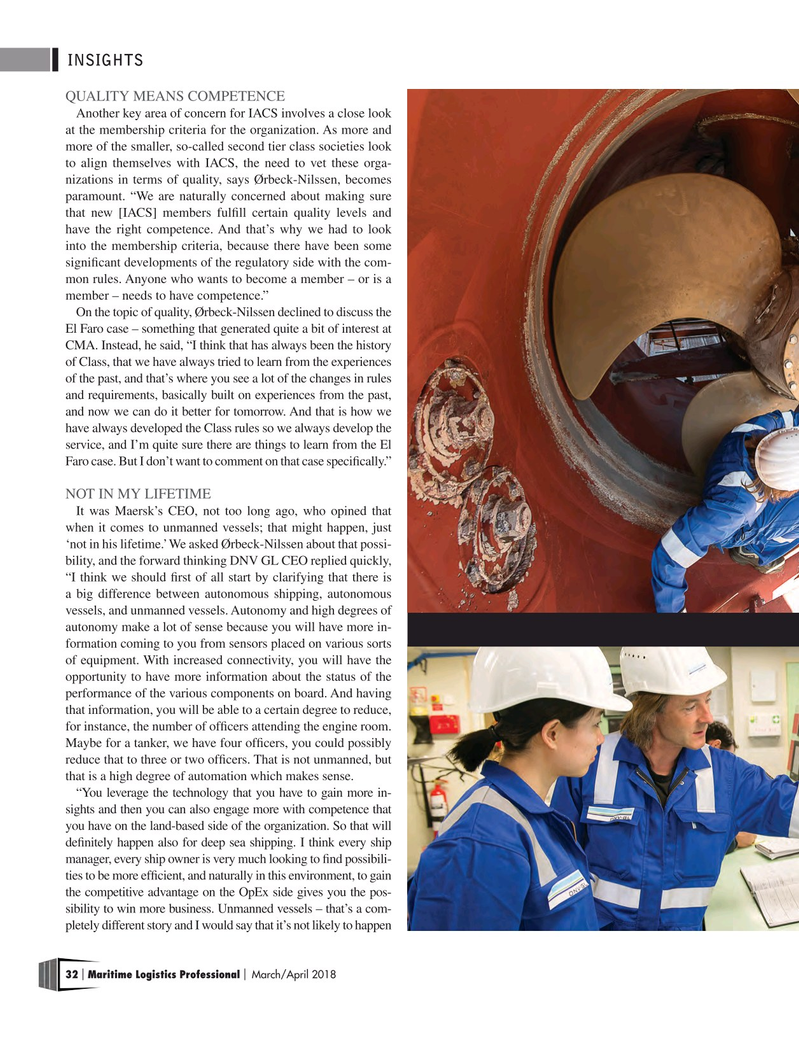
Page 32: of Maritime Logistics Professional Magazine (Mar/Apr 2018)
IT & Software
Read this page in Pdf, Flash or Html5 edition of Mar/Apr 2018 Maritime Logistics Professional Magazine
INSIGHTS
QUALITY MEANS COMPETENCE
Another key area of concern for IACS involves a close look at the membership criteria for the organization. As more and more of the smaller, so-called second tier class societies look to align themselves with IACS, the need to vet these orga- nizations in terms of quality, says Ørbeck-Nilssen, becomes paramount. “We are naturally concerned about making sure that new [IACS] members fulfll certain quality levels and have the right competence. And that’s why we had to look into the membership criteria, because there have been some signifcant developments of the regulatory side with the com- mon rules. Anyone who wants to become a member – or is a member – needs to have competence.”
On the topic of quality, Ørbeck-Nilssen declined to discuss the
El Faro case – something that generated quite a bit of interest at
CMA. Instead, he said, “I think that has always been the history of Class, that we have always tried to learn from the experiences of the past, and that’s where you see a lot of the changes in rules and requirements, basically built on experiences from the past, and now we can do it better for tomorrow. And that is how we have always developed the Class rules so we always develop the service, and I’m quite sure there are things to learn from the El
Faro case. But I don’t want to comment on that case specifcally.”
NOT IN MY LIFETIME
It was Maersk’s CEO, not too long ago, who opined that when it comes to unmanned vessels; that might happen, just ‘not in his lifetime.’ We asked Ørbeck-Nilssen about that possi- bility, and the forward thinking DNV GL CEO replied quickly, “I think we should frst of all start by clarifying that there is a big difference between autonomous shipping, autonomous vessels, and unmanned vessels. Autonomy and high degrees of autonomy make a lot of sense because you will have more in- formation coming to you from sensors placed on various sorts of equipment. With increased connectivity, you will have the opportunity to have more information about the status of the performance of the various components on board. And having that information, you will be able to a certain degree to reduce, for instance, the number of offcers attending the engine room.
Maybe for a tanker, we have four offcers, you could possibly reduce that to three or two offcers. That is not unmanned, but that is a high degree of automation which makes sense.
“You leverage the technology that you have to gain more in- sights and then you can also engage more with competence that you have on the land-based side of the organization. So that will defnitely happen also for deep sea shipping. I think every ship manager, every ship owner is very much looking to fnd possibili- ties to be more effcient, and naturally in this environment, to gain the competitive advantage on the OpEx side gives you the pos- sibility to win more business. Unmanned vessels – that’s a com- pletely different story and I would say that it’s not likely to happen 32 Maritime Logistics Professional March/April 2018 | |

 31
31

 33
33
